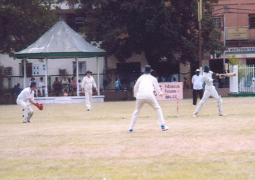
This was disclosed yesterday at a press briefing held at the conference room of the Central Bank of The Gambia (CBG) by the Monetary Policy Committee (MPC) of the bank.
The latest estimates from the Gambia Bureau of Statistics (GBoS) also indicated that the country’s real Gross Domestic Product (GDP) contracted by 1.4 per cent in 2014, compared to the growth of 4.6 per cent and 5.9 per cent in 2013 and 2012 respectively.
“Growth in reserve money decelerated to 11.9 percent in 2014, substantially lower than the growth of 28.1 percent a year ago,” CBG Governor Amadou Colley said while delivering the MPC report at the press briefing.
“The slowdown in the pace of expansion of reserve money was mainly the result of the contraction in the NFA [net foreign assets] of the Central Bank by 47.4 per cent on top of the earlier contraction of 17.7 per cent in 2013,” the central bank governor added, saying:“The NDA [net domestic assets] of the Central Bank, on the other hand, increased significantly to D4.5 billion, or 77.8 per cent.Central Bank net claims on government rose from D2.5 billion in 2013 to D4.4 billion in 2014.”
Continuing his report on the country’s domestic economy, precisely on Real GDP growth, Governor Colley said:“The latest estimates from the Gambia Bureau of Statistics (GBoS) indicate that real GDP contracted by 1.4 per cent in 2014, compared to the growth of 4.6 per cent and 5.9 per cent in 2013 and 2012 respectively.
“The deceleration in economic activity in 2014 was primarily due to lower agricultural production which declined by 22.0 per cent due to late and insufficient rains and the negative impact of the Ebola epidemic on the tourism sector.”
Money and Banking sector Developments
The CBG governor said ‘broad money’ grew by 11.2 per cent in the year to end-December 2014 compared with the growth of 15.1 per cent in the previous year.
“The decline in the growth of broad money was mainly the result of slower pace of expansion in the net domestic assets (NDA) of the banking sector by 14.2 per cent compared to 25.8 per cent in 2013.The net foreign assets (NFA) of the banking sector, on the other hand, increased by only 2.2 per cent following a contraction of 8.7 per cent in 2013,” he said.
Government Fiscal Operations
Speaking on government fiscal operations, which takes into account government’s revenue and income as well as its expenses or outlay, Governor Colley said preliminary data on the execution of the Government budget for 2014 indicate that total revenue and grants increased to D7.6 billion (22.4 percent of GDP), or 26.3 per cent from 2013.
“Domestic revenue, comprising tax and non-tax revenue, amounted to D6.4 billion higher than the D5.3 billion in 2013 attributed to the 20.8 per cent and 21.5 per cent increase in tax and non-tax revenue respectively,” he said.
On total expenditure and net lending, he said this amounted to D11.8 billion (35.1 per cent of GDP), higher than the outturn of D8.8 billion (27.0 per cent of GDP) in 2013.
“Current and capital expenditure rose to D7.8 billion and D2.8 billion compared to D6.5 billion and D2.3 billion respectively in 2013,” he said, adding that the overall budget balance (including grants) recorded a “deficit of D4.3 billion (12.6 per cent of GDP) which was financed by both domestic and external sources”.
Inflation
Consumer price inflation, measured by the National Consumer Price Index (NCPI), increased to 6.9 per cent in December 2014, from 5.6 per cent in December 2013, the bank governor said.
He added: “Both food and non-food inflation rose to 8.43 per cent and 4.83 per cent from 6.72 percent and 3.74 per cent in December 2013 respectively.Similarly, core inflation, which excludes the prices of volatile food items and energy, rose to 6.86 per cent in December 2014 compared to 5.86 per cent a year ago.”
At the last sitting of the MPC in November 2014, the Committee decided to leave the policy rate unchanged at 22.0 percent,” Governor Colley said, in a conference room full of commercial banks’ managing directors and CEOs.
“Although headline inflation exceeded the end-December 2014 target of 5.0 per cent, policy actions take time to work their way through the economy and to impact inflation,” he said, declaring the next policy rate to be utilised for the next three months.
“The MPC judges the stance of monetary policy appropriate for now and therefore, decided to keep the policy rate at 22.0 per cent,” the CBG Governor declared.




